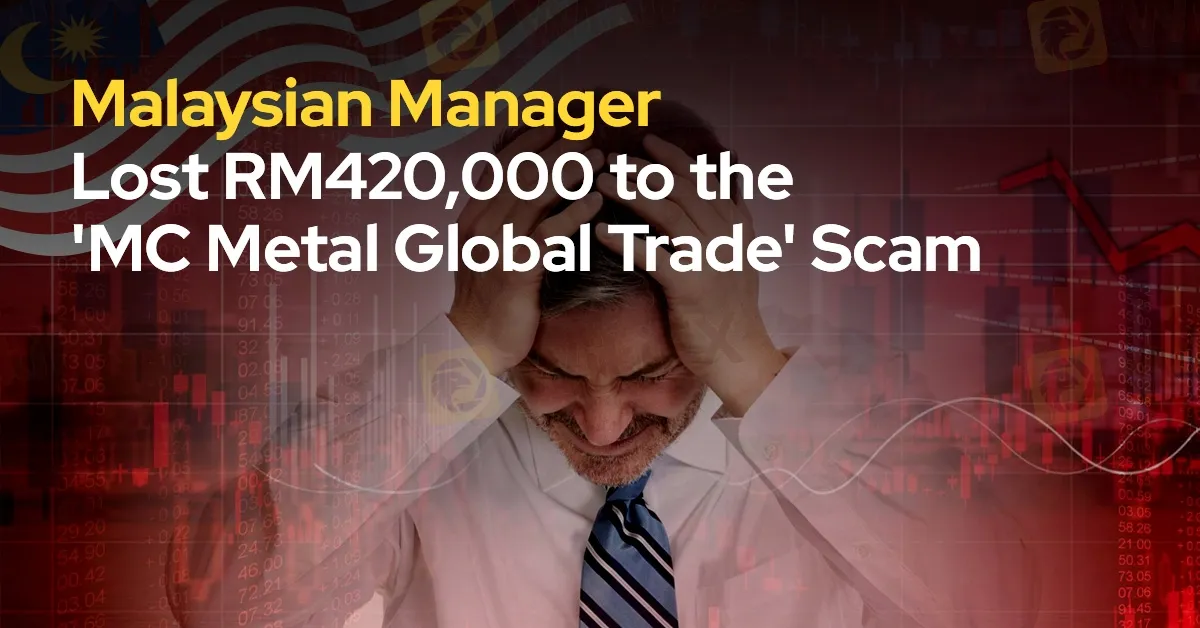简体中文
繁體中文
English
Pусский
日本語
ภาษาไทย
Tiếng Việt
Bahasa Indonesia
Español
हिन्दी
Filippiiniläinen
Français
Deutsch
Português
Türkçe
한국어
العربية
Malaysian Manager Lost RM420,000 to the 'MC Metal Global Trade' Scam
Abstract:A 33-year-old company manager from Ipoh, Malaysia, has fallen victim to an online investment scam, losing a staggering RM420,000 to the ‘MC Metal Global Trade’ investment scam.

A 33-year-old company manager from Ipoh, Malaysia, has fallen victim to an online investment scam, losing a staggering RM420,000. The incident began in late August when the man, while working in the Philippines, befriended a woman on social media. This seemingly innocent interaction quickly turned into a financial nightmare when the woman introduced him to an investment scheme named “MC Metal Global Trade.”
According to Ipoh district police chief Assistant Commissioner Abang Zainal Abidin Abang Ahmad, the woman encouraged the victim to invest in the scheme by providing him with a link to access the platform. Trusting the opportunity, the victim began transferring funds starting on September 7. Over the course of a week, from September 7 to September 14, he sent a total of RM420,000 to four different company accounts.
The victim realized he had been scammed when he found himself unable to access the investment link, which had been deactivated. Realizing the situation, he promptly lodged a police report on September 15, bringing attention to the scam.

Assistant Commissioner Abang Zainal Abidin further elaborated that the victim had used his personal savings to make the transfers. The transactions occurred while the victim was in various locations, including the Philippines, China, and Johor, Malaysia. The police are now investigating the case under Section 420 of the Penal Code, which deals with cheating and fraud.
The police chief also issued a public reminder to be cautious of investment schemes, particularly those found on social media that promise quick and substantial returns. He urged individuals to thoroughly verify the legitimacy of any such schemes before proceeding with financial commitments, noting that many scams rely on the allure of easy money to trap unsuspecting victims.
This unfortunate case serves as a stark reminder of the importance of vigilance in online financial interactions. Scammers are increasingly exploiting the anonymity of the internet to target individuals with seemingly lucrative offers, making it essential to double-check any investment opportunities, especially when they come from unfamiliar sources.

Disclaimer:
The views in this article only represent the author's personal views, and do not constitute investment advice on this platform. This platform does not guarantee the accuracy, completeness and timeliness of the information in the article, and will not be liable for any loss caused by the use of or reliance on the information in the article.
Read more

The Hidden Checklist: Five Unconventional Steps to Vet Your Broker
Forex broker scams continue to evolve, employing new tactics to appear credible and mislead unsuspecting traders. Identifying these fraudulent schemes requires vigilance and strategies beyond the usual advice. Here are five effective methods to help traders assess the legitimacy of a forex broker and avoid potential pitfalls.

Doo Financial Obtains Licenses in BVI and Cayman Islands
Doo Financial, a subsidiary of Singapore-based Doo Group, has expanded its regulatory footprint by securing new offshore licenses from the British Virgin Islands Financial Services Commission (BVI FSC) and the Cayman Islands Monetary Authority (CIMA).

CFI’s New Initiative Aims to Promote Transparency in Trading
A new programme has been launched by CFI to address the growing need for transparency and awareness in online trading. Named “Trading Transparency+: Empowering Awareness and Clarity in Trading,” the initiative seeks to combat misinformation and equip individuals with resources to evaluate whether trading aligns with their financial goals and circumstances.

Malaysian-Thai Fraud Syndicate Dismantled, Millions in Losses Reported
The Royal Malaysia Police (PDRM) has received 26 reports concerning the Nicshare and CommonApps investment schemes, both linked to a major fraudulent syndicate led by a Malaysian citizen. The syndicate’s activities came to light following the arrest of its leader by Thai authorities on 16 December.
WikiFX Broker
Latest News
ASIC Sues Binance Australia Derivatives for Misclassifying Retail Clients
Top 10 Trading Indicators Every Forex Trader Should Know
WikiFX Review: Is FxPro Reliable?
Malaysian-Thai Fraud Syndicate Dismantled, Millions in Losses Reported
Trading frauds topped the list of scams in India- Report Reveals
AIMS Broker Review
The Hidden Checklist: Five Unconventional Steps to Vet Your Broker
YAMARKETS' Jingle Bells Christmas Offer!
WikiFX Review: Something You Need to Know About Markets4you
Revolut Leads UK Neobanks in the Digital Banking Revolution
Currency Calculator


